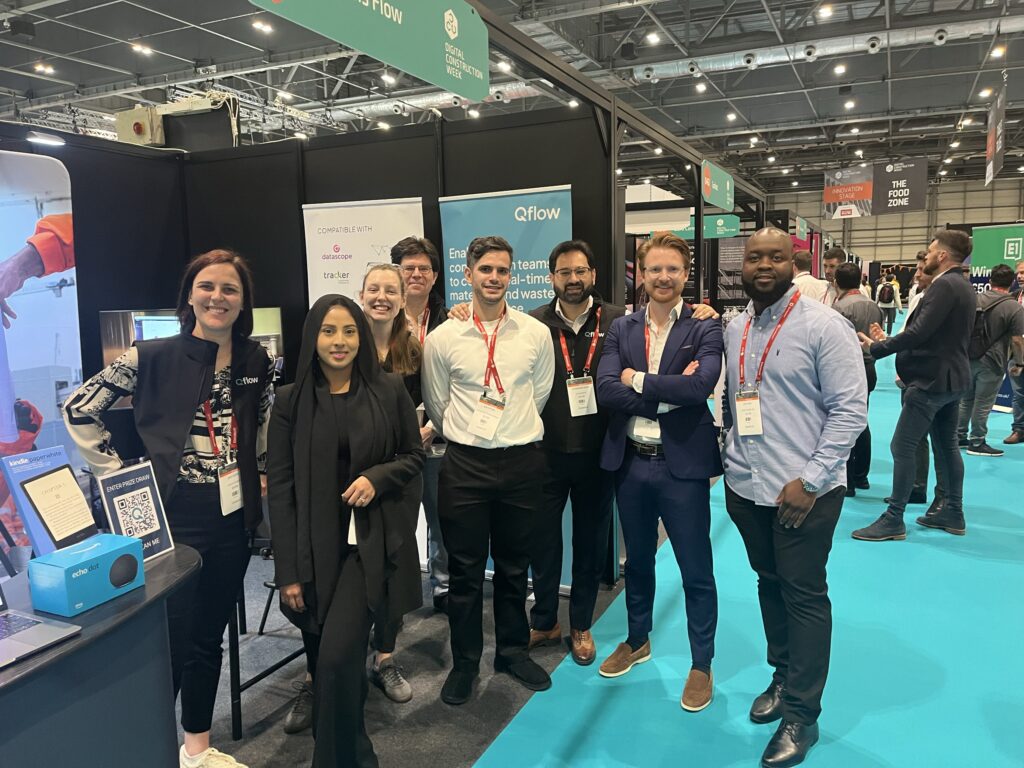
The Qflow team recently attended Digital Construction Week in London, which featured dedicated stages for information management, net zero, technology, and innovation.
Our team was exhibiting and informing built environment professionals how they can use Qflow to decarbonise their operations with a simple photograph.
Qflow Co-founder and CPO Jade Cohen was featured on a panel from Women in Construction Tech and LMRE, where she emphasised the value of increasing diversity in the sector.
Across the two-day leading industry event, key themes included:
The importance of data-driven decision-making.
“Data is still the new gold” was a sentiment echoed on one of the panels. Many speakers across the two days emphasised the importance of data for optimising construction and development processes.
Along with the usefulness of data itself, streamlining the processes of data collection and management was also stressed. Many speakers highlighted that the right tools and technology are needed to ingest, combine, and gather insights from the huge volumes of data being collected. This will allow companies to leverage the insights from their data points effectively.
The vital role of technology for the golden thread of information.
Accountability and transparency were big themes across Digital Construction Week, especially regarding the Building Safety Act. The act requires collaboration, data sharing, and better data recording to ensure safety considerations.
It was stressed that construction teams now must be proactive in avoiding the pitfalls of poor data quality and must move to a system where real-time data can be collected and easily shared.
Digital technologies were highlighted as the solution to these issues, especially as they can create a full audit trail for the golden thread of information which can be digitally stored.
Impending increases in information management requirements.
Along with legislation like the Building Safety Act, panels and speakers focused on the impending regulations that will increase the need for improved information management.
With the EU’s revised Construction Product Regulation (CPR) requiring a Digital Passport for all construction materials, keeping a digital record of building information will be key.
It was stressed that data and technology must be leveraged to adapt to the transformative changes impending regulations will have on the sector.
The use of AI and machine learning for data-related issues.
Across many sessions, AI was a popular topic of discussion, especially for its use cases in interpreting and managing data. One session highlighted how AI can be used to predict outcomes on a project and highlight supply chain risks.
The need for collaboration along the value chain to unlock decarbonisation.
In a discussion about driving sustainable construction, speakers emphasised that major companies across the sector need to align their decarbonisation goals for maximum impact. The panel highlighted that fostering a culture of openness and integrating innovative solutions into construction projects can accelerate decarbonisation.
Overall, it was clear throughout the event that data is rising up the agenda of all companies, with differences only around how advanced they are at integrating it into their business.
As the industry shifts to a more digital construction approach, Qflow can help companies transition their business to ensure they aren’t left behind.
Using Qflow’s software, companies can meet the material data requirements from the golden thread of information and leverage our insights to optimise their operations.
Qflow enables construction companies to make informed decisions on cost, carbon and quality by collecting real-time materials and waste data at source.
For more information on our technology – click here.

